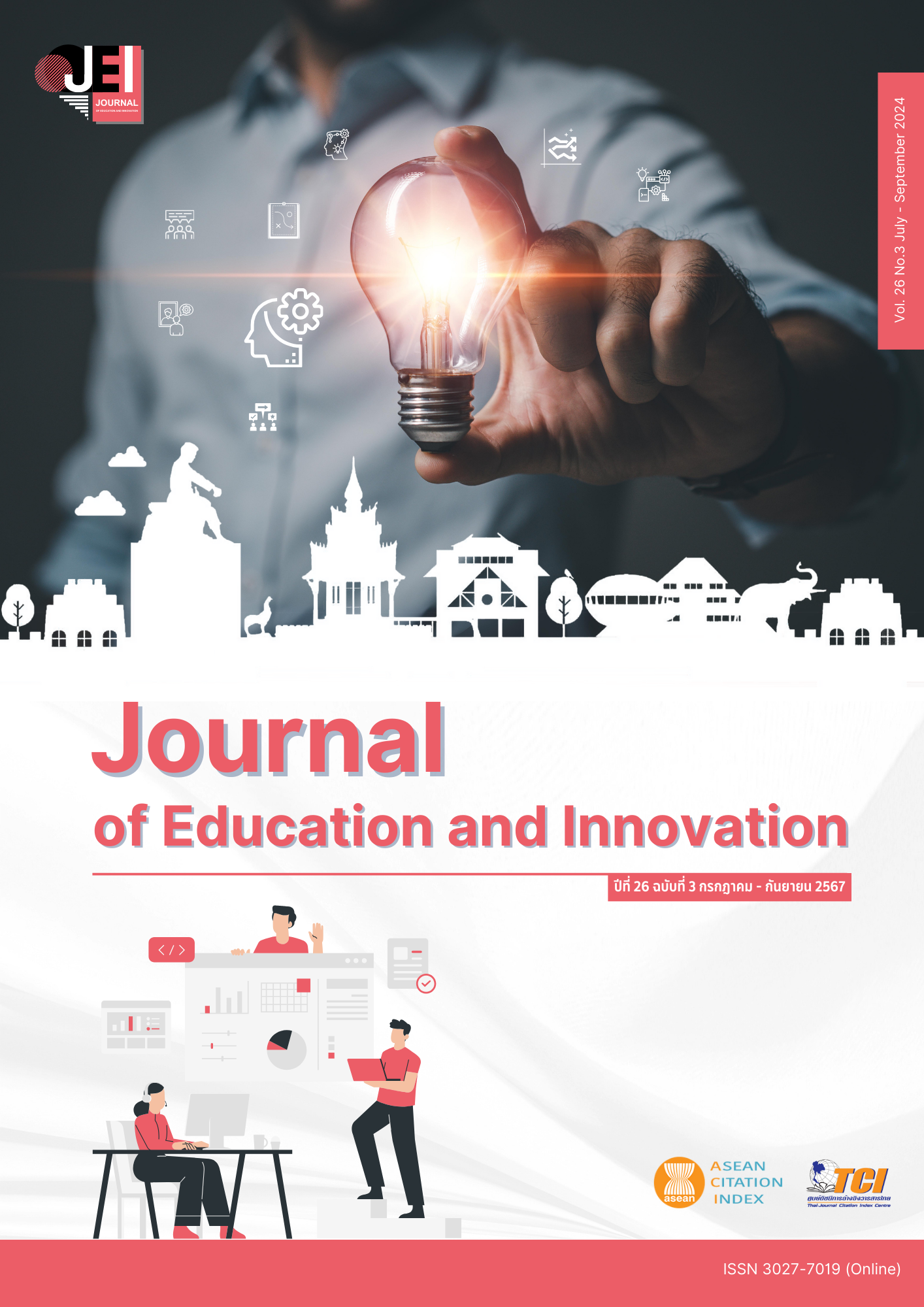DEVELOPING KNOWLEDGE MANAGEMENT METHOD TO ENHANCE EARLY CHILDHOOD TEACHERS’ CAPABILITYIN THE DIGITAL AGE
Main Article Content
Abstract
This research and development aims to: 1) study general information and settings of educational institutions for early childhood education; 2) develop and implement a knowledge management method to enhance early childhood teachers’ capability in the digital age; and 3) to assess childhood teachers’ satisfaction toward the knowledge management method. The research procedure included 3 steps: 1) study general information and settings of educational institutions of early childhood; 2) develop and implement the knowledge management method, consisting of 2 phases (training and trying out the knowledge management method); and 3) assess early childhood teachers’ satisfaction toward the knowledge management method. The research instruments were interview, questionnaire, and evaluation forms on early childhood teachers’ capability and satisfaction. The research sample was 40 early childhood teachers. The statistical analysis was made using percentage. The results were as follows: 1. Early childhood teachers should have experiences in learning management through the use of technology for early childhood education under the new circumstance where learning is managed online. Teachers should employ technology to design learning through a variety of computer software. It was also discovered that there were 4 steps of learning management, consisting of the uses of: 1) Active Learning; 2) 21st Century Learning; 3) innovations in early childhood education; and 4) Professional Learning Community. 2. After receiving training on learning management method, early childhood teachers showed a high-level capability at 85.82, which was higher than the predefined criteria ( = 4.29, SD = 0.62). 3. Early childhood teachers’ satisfaction toward the knowledge management method was at the high level (
= 4.17, SD = 0.48).
Article Details

This work is licensed under a Creative Commons Attribution-NonCommercial-NoDerivatives 4.0 International License.
The owner of the article does not copy or violate any of its copyright. If any copyright infringement occurs or prosecution, in any case, the Editorial Board is not involved in all the rights to the owner of the article to be performed.
References
Chatayapha, P. (2016). Technology and Early Childhood in 21St Century.Valaya Alongkorn Review (Humanities and Social Science), 6(2), 151-162.
Development of Digitality for Economy and Society Act. (2017). Royal Thai Government Gazette. Volume 134, Part 30. Retrieved from http://www.ratchakitcha.soc.go.th
Fang, R. J., Tsai, H. L., Lee, C. J., & Lin, C. A. (2011). In the artificial society of choosing digitalized teaching materials with theory of planned behavior. AIKED'11: Proceedings of the 10th WSEAS international conference on Artificial intelligence, knowledge engineering and data bases (pp. 354 – 358).
Funchien, N. (2019). How Must Education 4.0 Be? Retrieved from https://www.earlychildhoodteacher.org/blog/six-strategies-for-21st-century-early-childhood-teachers/
Hibbs, P., & Kulapichitr, U. (2016). Roles of parental mediation for promoting media literacy of preschoolers in child development centers in the Bangkok Metropolis. An Online Journal of Education (OJED), 11, 18-29.
Karpati, A. (2011). Digital Literacy in Education. Retrieved from http://unesdoc.unesco.org/images/0021/002144/214485e.pdf
Ministry of Education. (2019). Announcement of the Ministry of Education Re: Policies and Focuses of Ministry of Education, Fiscal Year 2021. Bangkok: Ministry of Education.
Morrison, G. R. (2004). Experimental research methods. New Jersey: Lawrence Erlbaum Associates Publishers.
Office of the Education Council. (2019). Executive Summary of Guidelines to Develop and Improve Teacher’s Digital Literacy. Bangkok: Prikwarn Graphic.
Panich, V. (2012). Facilitate learning for students in the 21st century. Bangkok: Sodsri-Saridwongso Foundation.
Sidhisamarn, S. (2016). How to Drive Forward Thailand Education to Fulfil Thailand Economy 4.0”. Retrieved from http://www.manager.co.th/qol/viewnews.aspx?NewsID=9590000069668
Swick, J. K. (1989). Appropriate uses of computer with young children. Educational Technology, 29(1), 7-13.
The Twelfth National Economic and Social Development Plan. (2019). Royal Thai Government Gazette. Volume 136, Part 47, pp. 5–6.
Thouvenelle. (2002). Do Computers Belong in Early Childhood Setting? Retrieved from http://www.earlychildhood.com/Articles/index.cfm?FuseAction=Articles&A=23
Wongyai, W., & Patphol, M. (2020). Digital Competency. Bangkok: Graduate School, Srinakharinwirot University.


